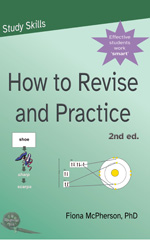To master a skill:
- Practice it until you reach the stage where actions follow automatically
- Practice more efficiently, by:
- varying your actions
- providing immediate feedback
- spacing out your practice
Remembering a skill is entirely different from remembering other kinds of knowledge. It’s the difference between knowing how and knowing that.
Practice, practice, practice
Practice is the key to mastering a skill. One of the critical aspects is assuredly the fact that, with practice, the demands on your attention get smaller and smaller. Interestingly (and probably against common sense), there appears to be no mental limit to the improvement you gain from practice. Your physical condition limits how much improvement you can make to a practical skill (although, in practice, few people probably ever approach these limits), but a cognitive skill will continue to improve as long as you keep practicing. One long-ago researcher had two people perform 10,000 mental addition problems, and they kept on increasing their speed to the end.
How to get the most out of your practice
While practice is the key, there are some actions we can take to ensure we get the most value out of our practice:
- Learn from specific examples rather than abstract rules
- Provide feedback while the action is active in memory (i.e., immediately). Try again while the feedback is active in memory.
- Practice a skill with subtle variations (such as varying the force of your pitch, or the distance you are throwing) rather than trying to repeat your action exactly.
- Space your practice (maths textbooks, for example, tend to put similar exercises together, but in fact they would be better spaced out).
- Allow for interference with similar skills: if a new skill contains steps that are antagonistic to steps contained in an already mastered skill, that new skill will be much harder to learn (e.g., when I changed keyboards, the buttons for page up, page down, insert, etc, had been put in a different order — the conflict between the old habit and the new pattern made learning the new pattern harder than it would have been if I had never had a keyboard before). The existing skill may also be badly affected.
- If a skill can be broken down into independent sub-skills, break it down into its components and learn them separately, but if components are dependent, learn the skill as a whole (e.g., computer programming can be broken into independent sub-skills, but learning to play the piano is best learned as a whole).
- Anderson, J.R., Fincham, J.M. & Douglass, S. 1997. The role of examples and rules in the acquisition of a cognitive skill. Journal of Experimental Psychology: Learning, Memory and Cognition, 23, 932-945.
- Chase, W.G. & Ericsson, K.A. 1981. Skilled memory. In J.R. Anderson (ed.) Cognitive skills and their acquisition. Hillsdale, NJ: Erlbaum.
- Wulf, G. & Schmidt, R.A. 1997. Variability of practice and implicit motor learning. Journal of Experimental Psychology: Learning, Memory and Cognition, 23, 987-1006.
